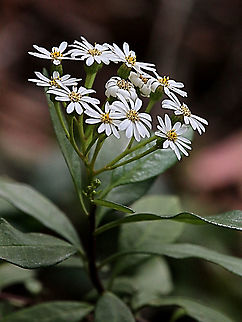
Appearance
''Olearia phlogopappa'' is a small, erect shrub that grows 0.3–3 m high with greyish foliage. The leaves are arranged alternately, leaf shapes differ from narrow egg-shaped or narrow obovate 8–114 mm long and 3–23 mm wide on a short stalk.The upper leaf surface is a dull grey-green, smooth or with fine minute star-shaped hairs. The underside has a whitish or yellowish appearance. The leaf margins vary, they may be slightly scalloped, toothed or evenly spaced slanting serrations.
Dusty daisy-bush has varying colours with the most common being white but can be blue or pink. The flowers are in terminal clusters from the side branches about 15–25 mm in diameter. The 4-5 bracts are bell-shaped to hemispherical, arranged in rows covered with short soft hairs, occasionally glandular. There are usually 10-14 ray florets on an individual "daisy" flowers and bloom in spring and early summer.
The fruit has 5 ribs 2–3 mm long and has a single seed called an achene.
Naming
''Olearia phlogopappa'' was first formally described by Jacques Labillardière in 1806 and published in ''Novae Hollandiae Plantarum Specimen'' and named ''Aster phlogopappus''. The specific epithet is derived from the Ancient Greek words ''phlogos'' meaning "flame" and ''pappos'' meaning "pappus", referring to the flame-coloured ring of hairs above the ovary cited in the original description.Distribution
''Olearia phlogopappa'' is wide spread and common from coast to mountains, found in both dry and wet sclerophyll forests. Found in eastern New South Wales, Victoria, and Tasmania.References:
Some text fragments are auto parsed from Wikipedia.